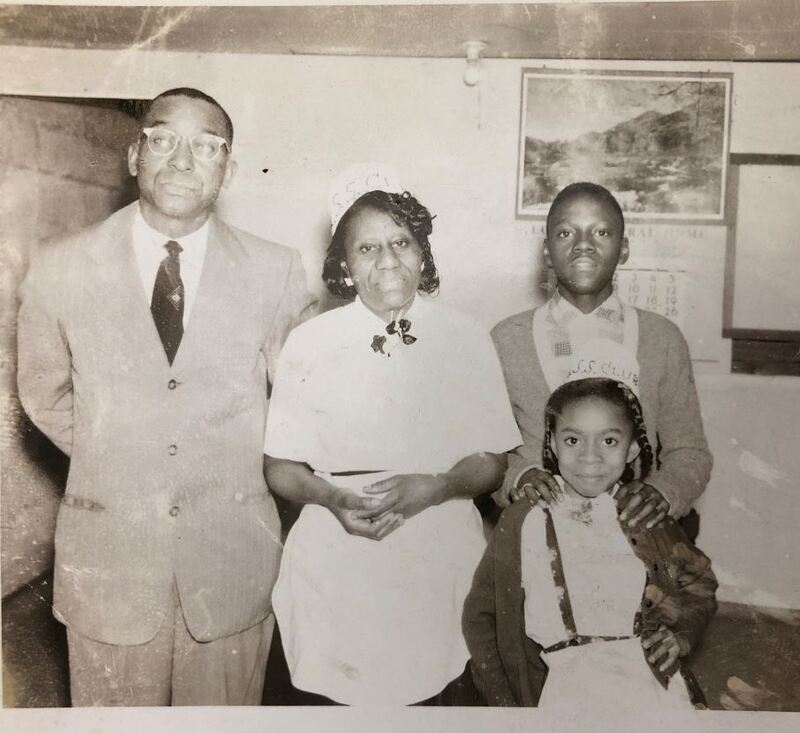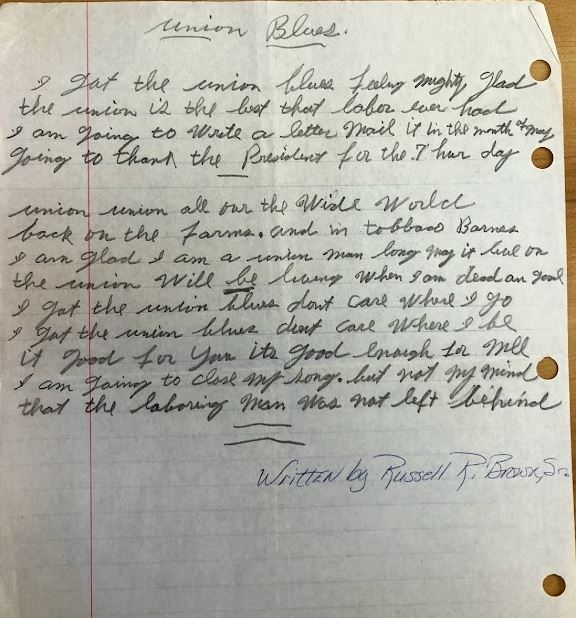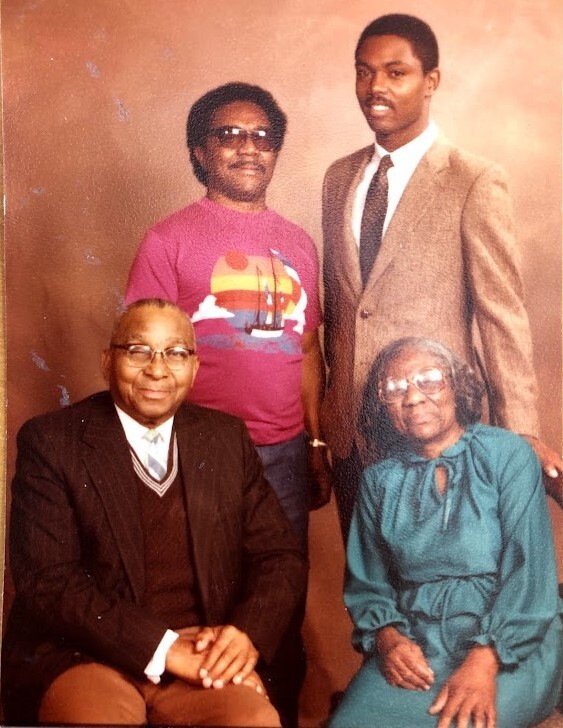Russell Brown
On 27 May 1940, folklorist George Korson was at Yolyn on Rum Creek in Logan County and he recorded Russell Brown singing Union Blues. Korson wrote this about Mr. Brown’s song in his book Coal Dust on the Fiddle:
“Sung by Russell Brown who introduced it at a 1935 Labor Day celebration at Charleston, West Virginia, where John L. Lewis was the speaker.
‘I was lying in bed thinking about the union and the words came to me. I hopped right out of bed and wrote them down.’—Russell Brown.”
Russell R. Brown, the son of the late Charlie and Mattie Brown, was born on January 10, 1904 at Winona, on Keeney Creek in the Nuttall district of Fayette County in West Virginia, where his father was a coal miner. The acclaimed historian Carter G. Woodson, who was the son of enslaved parents and who has been called “the father of black history,” taught there from 1897 to 1900 at a school established by Black miners for their children; several of Russell Brown’s older siblings were in school during those years so it’s likely they were taught by Dr. Woodson, who himself at the age of seventeen had begun working as a miner there in the Nuttall district before being able to attend high school in Huntington. Russell Brown completed three years of high school and all his siblings were well-educated for that time and place. He moved to Logan County, WV in the early 1920s, where met and married Marietta Franklin.
-- written by Gloria Goodwin Raheja, March 2021
New Information on Russell Brown
Little else was known about Russell, but in 2021 I was able to locate some of Russell's family, including a son and granddaughter living in Huntington, WV, who were able to fill in some gaps.
According to Russell's son, Clarence, and Clarence's daughter, Christina, Russell worked 35 years as a tipple man in various locations in Logan, including the community of Yolyn on Rum Creek, for the Buffalo Chilton Coal Company. Upon retiring from the coal company, he worked as a baggage and ticket man for the Trailways Bus Company in Logan.
After leaving Logan to be closer to his children in Huntington, he became very active with many civic organizations, especially ministering to the poor with the Stella Fuller Settlement House, and serving as a foster parent at the Huntington State Hospital.
Clarence described his dad as having “adventurous” mind, and that he was always coming up with new projects with which to get involved. “He’d get a little church meeting going somewhere, or he’d have an idea to start a small store in a vacant building on the block. He was always thinking about some activity.”
Both Clarence and Christina related stories of how Russell, always dressed in a complete suit and nice hat, would walk around his neighborhood in Huntington, just checking things out. He’d often stop and sit on Clarence’s porch unannounced. If Clarence or the grand kids would notice him on the porch swing, they’d check on him and he’d usually say something along the lines of, “I’m just taking a rest before I walk back home.”
Christina described her grandfather as a very peaceful man. He didn’t get upset at anything. He’d go through the day humming songs and always had a gentle demeanor about him--"he was content," she told me. Sometimes he’d ask Christina if she knew the melody he was humming, saying he was not sure where it came from, but it was just on his mind.
When asked about his musical abilities, Christina and Clarence both said that he wrote several songs, mostly religious hymn-type songs, and poems, but that it was not something he did a lot of. The family knew of his Union Blues composition, and knew that it was recognized by John L. Lewis at the union meeting in Charleston, but only through a few snippets of the lyrics Russell had written down on lined notebook paper some years ago, and through hearing him sing/hum the melody every now and again around the house. They had no idea the performance was recorded and was available in the Library of Congress until Chris informed them back in February of 2021. After listening to the recording, Christina replied with excitement, "that's my grandfather's voice...that's my grandfather!"
Russell Brown died on 5 December 1988 at Huntington, West Virginia, and is buried beside his wife, Marietta, in Woodmere Memorial Park.
--written by Chris Haddox, June 2021
Sources:
- Raheja’s research for her book Logan County Blues: Frank Hutchison in the Sonic Landscape of the Appalachian Coalfields.
- Korson, George. 1943. Coal Dust on the Fiddle: Songs and Stories of the Bituminous Miners. Philadelphia: University of Pennsylvania Press.
- The George Korson Collection, 1913-1975 [audio recordings and manuscript notes]. Library of Congress AFC 2003/011.
- Goggin, Jacqueline. 1993. Carter G. Woodson: A Life in Black History. Baton Rouge: Louisiana State University Press.
- Chris Haddox conversations with Christina Brown via telephone (she in Huntington, WV), March 22, 2021, and subsequent conversations in person in Huntington, May 8, 2021.
- Chris Haddox conversations with Clarence Brown via telephone (he in Huntington, WV), May 18, 2021.
Listen to Russell sing his Union Blues for song collector, George Korson, in Yolyn, WV in 1940:
Russell Brown singing his composition, Union Blues
-Recording from the Library of Congress, used with permission of the family of Russell Brown
A Visit to Russell Brown's Grave for the Singing of Union Blues
In May of 2021, I was able to visit with Christina Brown, grand daughter of Russell Brown. I had spent a few months trying to track down family members, and that path eventually led to family historian, Christina. Christina provided many of the detail of Russell's life in the biography above. She gladly shared pictures and other artifacts that provided some idea about Russell and his personality. Together we visited the Woodmere Cemetery in Huntington and I was honored to be able to sing his composition, Union Blues, over his grave with Christina present.



